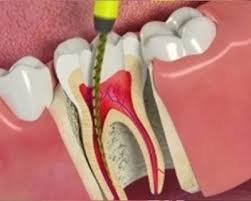Root canal treatment is an integral dental procedure that removes bacteria, soothes discomfort and preserves natural teeth. While the process can be daunting, its importance cannot be understated when it comes to improving oral health and maintaining optimal wellness.
Root canal treatment begins by administering local anesthetic to ensure your comfort, then creating an opening in the tooth to access its pulp and remove any damaged tissues, before cleaning and filling it with rubber-like gutta percha material.
Table of Content
1. What is a root canal?
Root canal therapy is a dental procedure used to save infected teeth. A root canal involves entering an infected tooth and extracting any dead or dying nerve tissue and bacteria before sterilizing its interior before filling and sealing it with a dental crown.
Root canal treatments may be carried out by both dentists and endodontics; the latter often specialize in more complicated or advanced cases. Endodontic specialists possess two to three years of additional training to treat diseased tooth pulp.
Root canal procedures are generally straightforward procedures with high success rates. Patients may experience some discomfort following root canal treatment; this should usually be managed using over-the-counter pain relievers. After having undergone root canal therapy, it’s best to avoid chewing directly on the affected tooth until its restoration with a permanent crown is complete.
2. Why do I need a root canal?
Endodontics (root canal treatment) may become necessary when the blood vessels and nerves of a tooth become infected or inflamed due to deep decay, repeated dental procedures on one tooth, cracks or chips in its enamel that expose its inner core to bacteria from oral environments, etc.
Painful symptoms associated with tooth infections can include pain and sensitivity to hot and cold liquids and food, lasting weeks or months before being resolved by treatment in a dentist office or by consulting an endodontist with four years or more postgraduate training. Untreated infections may even lead to pus accumulation at the tip of root tip and destruction of bone surrounding tooth root tip, ultimately necessitating extraction and/or removal by specialists such as endodontists.
3. What is a root canal treatment?
Root canal treatment is a procedure designed to save and repair an infected tooth, usually the inner soft part of it, known as pulp, which contains nerves and blood vessels. If damaged or infected pulp becomes damaged or infected it may cause pain and swelling; left untreated bacteria could eat away at its supporting bone structure and loosen or cause the removal of its supporting tooth altogether.
After your tooth has been rendered numb, an opening will be created through its crown to reach the damaged area. After removal of damaged tissue and shaping each root canal before filling them with rubber-like sealant material to seal them, medicine may also be placed into its pulp chamber and root canals to fight bacteria.
Once root canal treatment is completed, a temporary filling or crown may be applied to protect the tooth until it has fully recovered and to reduce reinfection. It is important that chewing does not occur until all signs have subsided.
4. How is a root canal treatment performed?
Root canal surgery is performed at the dentist’s office and starts by administering local anesthetic to numb the area before placing a dental dam around your tooth to protect it from saliva during the procedure.
Underneath your hard enamel and dentin layers is a soft tissue composed of blood vessels, nerves, and connective tissues called pulp. While children require pulp for proper root development, adult teeth can survive without its help.
After having undergone root canal treatment, your tooth may feel sensitive or sore due to inflammation of its surrounding tissues. This is a normal reaction and can be treated using over-the-counter pain medication. For optimal healing of your tooth and proper restoration of its health, be sure to keep up good oral hygiene habits as well as follow up appointments with your dentist in order to ensure complete healing of its contents.
5. What is the aftercare for a root canal?
Aftercare of a root canal procedure is essential to speeding recovery and preventing complications, including managing discomfort, maintaining oral hygiene practices and attending follow-up appointments.
Swelling and sensitivity following root canal treatment is normal, but they can be reduced with a cold compress. To use one, wrap an ice cube or bag of frozen peas in cloth or towel and press it against your cheek over the affected tooth for several minutes at a time until relief has been provided.
After root canal treatment in Noida, it is vital to practice good oral hygiene habits by brushing twice daily and flossing at least daily, using mouthwash regularly and avoiding hot or cold food/beverages which could irritate their treated tooth.
